Published Apr 3, 2013
You Ask The Q's, Ronald D. Moore Answers, Part 2
You Ask The Q's, Ronald D. Moore Answers, Part 2
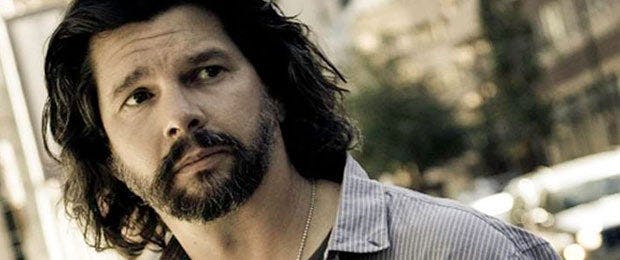
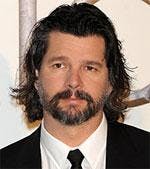
Ronald D. Moore has been out of the Star Trek game for a long time, but it’s a game he loved and remains thrilled to have been associated with, and he won’t rule out returning to it one day. Moore, as most fans know, wrote and/or produced The Next Generation, Deep Space Nine and, briefly, Voyager, as well as the features Generations and First Contact. Post-Star Trek, Moore struck gold with the re-imagining of Battlestar Galactica and also worked on Caprica and Virtuality. He just signed a deal to executive produce a new series entitled Helix. Moore is about to get busy with Helix, but followed through on his promise to StarTrek.com to answer Trek questions posed mostly by you, the readers. Below is part two of our interview.
Tod Lackey asks: So many sci-fi spin-offs and re-imagined series (Knight Rider, V, Bionic Woman) have failed commercially. What made Star Trek and BSG different?Moore:Star Trek has very, very strong bones. The original concept was just very strong and, at the same time, flexible. You could play a lot of different kinds of stories in the idea of a starship boldly going, arriving in a new society, a completely alien world. You could play with a whole series of sets of problems and adventures with a starship crew and this society and then leave at the end of the episode and go do it again next week. There’s just a huge canvas of stories you can tell. You can just keep riffing on that. It wasn’t such a challenge to reinvent it. Even J.J.’s work… there just had been so much Star Trek by that point that it kind of needed to wipe the slate clean and start over. It wasn’t that Trek lacked imagination; it was just that the franchise had been burdened down by its own continuity. And with Battlestar, it was a good idea at the heart of the original series that I felt like never got a chance to really breathe. It was this really interesting, dark idea of these people fleeing an apocalypse and being chased into the night by the Cylons. The original ABC show kind of had to go for more of a popcorn feel and be fun and silly. No one had ever delivered on the premise itself, so that gave us our opportunity. These other shows, some of them are best remembered through the rose-colored glasses of hindsight. Knight Rider? I don’t know that Knight Rider was ever a great show. It was a fun one and we all watched it as kids. It looms bigger in your memory than if you sit down and actually try to watch the show. A lot of the shows are like that. The Six Million Dollar Man is a great concept, an interesting idea, and probably ripe to be redone at some point under the right auspices. But the original show, if you’ve watched some of the episodes over the years, it creaks a bit. It was also a show of its time. So, not everything can be reinvented and some things are just best left in their original packaging.Samuel Villagomez wants to know: (1) What was your experience like when you were working on Star Trek? (2) Would you consider doing a DS9 or Voyager movie?Moore: My memory is almost entirely positive. When I left the franchise after 10 years I could honestly say that there were only one or two days when I didn’t want to show up for where I was unhappy. The rest of the time, it was just a joy. It was hard work and long hours, and we were shooting 26 episodes which, right now, makes my head spin. So I don’t know how we did the pace we did, but it was always exciting and it was always great. It was a challenge. It was a wonderful period of my life. It really was. And, yeah, if there was a chance to do a Deep Space Nine movie, sign me up. I’m there.Angel Bennett Ron asks: If you could write a new TNG storyline or character arc not previously written for Patrick Stewart and cast, what would you write about?Moore: Hmm… There was a story that Ira (Behr) developed for the third season that got canned and ultimately turned into the episode called “Captain’s Holiday.” It was about Picard going down to a planet, forced on a vacation, but while he was there he’d gone to some facility where you face your own deepest fears. He went through this whole story about being on the Enterprise and the way people treated him and, ultimately, his fear being that he’d be Data, that he was turning himself into a robot, and that he was so cut off from his own emotions and so cut off from the people he loved and admired around him. He suddenly looked in the mirror in this episode and was shocked to see that he was becoming this caricature of himself. It was meant to break him out of that and have him try to reach out to the crew and to the people who were his friends, even though he’d probably never said that to them overtly. I still love that storyline and I loved the idea of taking Picard into emotional territories that were dangerous for him, that he’d seemed to wall off for various reasons. It put him on the rock a little bit and really challenged him. I thought that was really interesting.
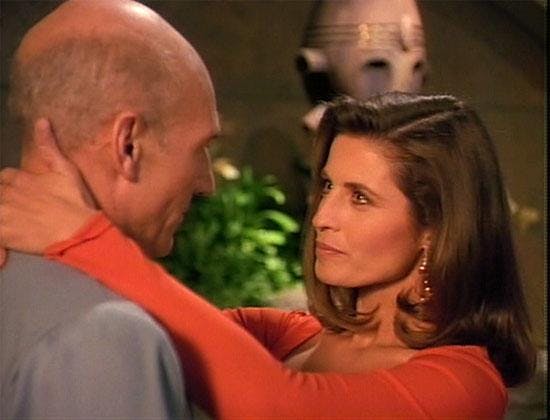
Thane Himes notes: Your brief stint on Voyager and disagreement with how that show progressed has been pretty highly publicized around these parts. But if you had been the show runner for Voyager when you joined the show in its sixth season and hadn't left, what are some changes you immediately think you'd have made?Moore: Oh, that’s hard to say. I think I ran into the difficulty of what I wanted to do and what I could have done. The truth was, it was still Star Trek, and I think there were things I wanted to do with Voyager that I could never really accomplish. I couldn’t do those things until I went to Battlestar. I was talking about roughing up the ship, having the culture of the ship degenerating, having more divisions and camps within the crew. They’re out on the other side of the galaxy and away from home for a very, very long time with no real notion of when they’d get back, and I thought that would start to develop their own culture, or cultures, within the ship, that that would become a challenge to the military hierarchy of the starship. I wanted to go down some really dark roads, with the ship falling apart, the crew falling apart and at each other’s throats periodically and vying for control. The truth is I don’t know that I really could have done that at Star Trek, no matter what the political circumstances were, because the show was not designed to tell that kind of story and it really would have flown in the face of a lot of things Gene had set up and that he had said were important to him. So I think I probably had somewhat unrealistic goals of where I wanted to go (with Voyager), but then I found an opportunity to do them on Battlestar.
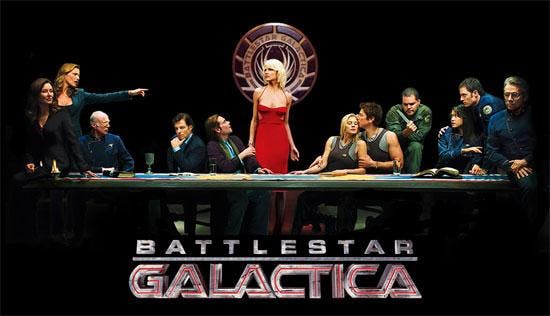
Brian Rollins says: You're one of the few sci-fi writers in Hollywood to use religion in your shows. What kind of resistance/acceptance do you see from industry insiders and fans?Moore: I was amazed that I didn’t get a lot of resistance from the industry. For whatever reason, SCI FI Channel and Universal just let me run with it on Battlestar. They didn’t have problems with it. They had other problems, but they didn’t have any problems with the religious stuff in the show. And the fans, it was an interesting reaction. There’s a surprising core of fandom that just hates any kind of religion in their science fiction. They really don’t want to mix these things together. I’m not quite clear what that’s about and why they’re so opposed to mixing these things. It becomes a very purist argument. People will say, “If there’s any kind of religion in it, it’s not science fiction anymore.” Well, I don’t really buy that. People believe in religions and there are weird, mysterious things that happen in the universe. Why not play with that, too? Why isn’t that just as valid as everything else that’s part of the human condition, which is theoretically what sci-fi is supposed to be exploring.Tracy Avent-Costanza and several other people asked variations of this question: Where do you get your ideas from?Moore: I have a box, and I open the box periodically and take out an idea, then close the box again before anybody else gets in. (Laughs). No, I’ve just always been a storyteller. I have very early memories of regaling kids on the playground with made-up stories, crazy adventures of things that clearly didn’t happen, just fantasy tales of what I did. You know, me and my dog went to the moon. Just that kind of crazy stuff. I’ve always loved telling stories and I’ve always written stories. I don’t know where it comes from; it’s just something I do and something I do kind of naturally and easily. It’s whatever gift I have.By popular demand, we’ve got to ask about your hair. LOTS of fans said you look like Al Snow, Lorenzo Lamas or commented on the length of your hair…Moore: My hair? The funny thing is that when I go back and look at stuff from TNG, I went through a lot of haircuts. People kind of forget, I had big heavy-metal hair for a while, and then I cut it all off and had a crew cut for a while. I just cut it all off one day and had that for years, then slowly started growing it out again. I mostly change my hair when my wife tells me to.
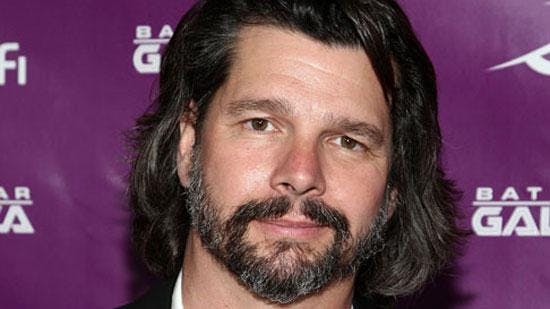
This is a corollary to something you answered earlier. Stephen Hills wants to know: If there was to be another Trek show would you be interested (in getting involved)?Moore: I would love to do another Star Trek show. It would all depend on timing and who’s involved and what the auspices are and concepts, but sure. I have tremendous fondness for the franchise and I would love to do something with it again someday.Donna Gregory wonders: As someone who has a Star Trek background and who successfully re-imagined a TV series and made it a pop culture legend (and THANK YOU for BSG!), what do you think of the re-imagining of the Star Trek universe?Moore: I was very pleased with it. I walked out of the theater with a smile on my face. I thought it was fun. I thought it revitalized the franchise. It gets you excited to see everybody again. I thought it was an exceptional cast, and they all brought something really interesting to their portrayal of those iconic characters. People have picked apart the plot in the years since and get wrapped up in the technicalities of this and that… but, yeah, you can always do that. The bottom line was, it really worked. I enjoyed it. I think most people enjoyed it. And I think it opened the door to a new generation of fans, because the franchise up to that point, as I said earlier, was so encumbered by its own continuity and its own back stories that I think it was really, really difficult to get new people to try Star Trek, because there was just such a huge learning curve they had to go through. Now, with the re-imagining of it, people could just start over and enjoy it and then go discover all the various permutations and spin-offs later on. It has to be inviting for people to sample it for the first time, and it did.We had lots of other questions, but we know you’re tight for time. So let’s make this the last one. Frank Hunt asks: What were the most important lessons you took away (as a writer and producer) from your time working on Star Trek?Moore: That it’s all about the characters and that you really have to be willing to dig into the characters and make it about the people and understand them. That means sitting in rooms for hours on end and arguing about who these people really are. It’s about trying to challenge the characters and challenge yourself. It’s really the lifeblood of television. It’s what it’s all about. People tune into these shows again and again not for the plot of the week and not because they want to be wowed by visual effects. They tune into the show because they fall in love with the characters. They fall in love with Kirk and Spock and Sisko and Janeway and Picard and Data. They want to see those people again. So it’s all about the characters, and that’s the most important thing I learned at Trek.Click HERE to read part one of our interview with Ronald D. Moore.

